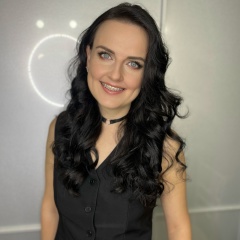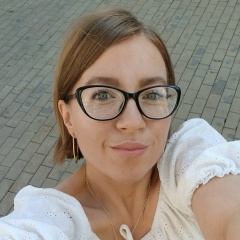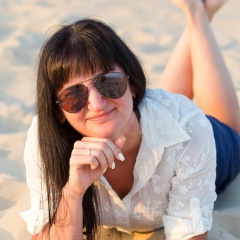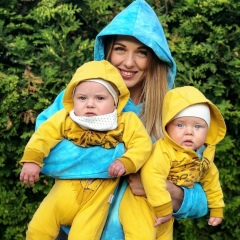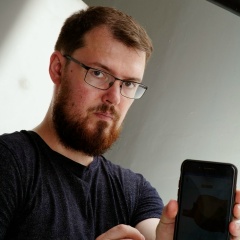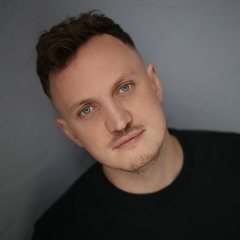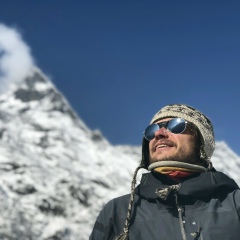Я нажала на кнопку дверного звонка. Прошло около минуты, пока в замке повернулся ключ.
«Здравствуйте, Владимир Александрович. Я Люба, мы с вами договорились сегодня пообщаться».
Владимир Александрович Щуцкий живет в социальном доме, на 13 этаже, в обычной однушке, где на стенах ковры и рукоделие его покойной жены, в углу трюмо с фотографиями и статуэтками, сервиз в запылившейся стенке, залитая солнцем застекленная лоджия с самоваром, который служит подставкой старым книгам и газетам.
Сын обижен и с недавних пор не приходит, внучки бывают, но редко, почти все время он один. Ходит плохо, за плечами инфаркт и инсульт, правая рука не хочет работать. Но глаза ясные, мысль быстрая и чувство юмора не оставляет ветерана.
У него есть цель – получить медаль «За Отвагу». Не свою, отца. Приказ есть, а медали до сих пор нет. Недостаточно оснований, говорили раньше, когда архивы были засекречены, отец Владимира Александровича считался пропавшим без вести и никто толком не знал, за что дали «Героя».
В 2013 году в социальный дом приехала строгая молодая женщина, вручила Щуцкому-младшему документы из секретного архива и ушла. Спустя 60 лет беспрерывных поисков Владимир Александрович сидел на своей кровати с папкой, которая открывала тайну смерти папы и не мог читать из-за слез.
Александр Щуцкий, возвращаясь из разведки наткнулся на отряд фашистов, которые вели огонь по расположению части. Он метким огнем уничтожил в перестрелке пятерых врагов, чем помог роте продвинуться вперед. Но и сам получил в этом бою смертельное ранение. И его семья даже не знает, где он был захоронен.
Володя в это время жил и помогал работе штаба, который расположился в здании вечерней школы. Он топил печи, носил воду, таскал дрова. Иногда ночевал прямо в штабе, иногда возвращался в комнатку к бабушке на проспекте Ленина, куда переехала семья, когда однажды их дом разбомбили. Вскоре бабушка умерла прямо у Володи на руках. Потом мама попала в больницу для дистрофиков (есть фото с тех времен, где некогда красивая женщина больше похожа на живой скелет). Потом умерла сестренка Валя от дифтерита. Потом умер дедушка. «Как я пережил столько горя, не знаю сам» - говорит Владимир Александрович и его голос срывается, больно до сих пор.
Мама вернулась из больницы и знакомые подсказали им пойти на Ижорский завод. Это стало спасением в Блокаду. На заводе была столовая, рабочих кормили. А все остальное не имело значения.
Перед самым прорывом Блокады детей и стариков эвакуировали из Ленинграда по Дороге Жизни, увезли в Барнаул и маму с Володей. В тылу было полегче, всем блокадникам полагался «Ждановский паек» и относились к ним, как к героям. Здесь Володя начал работать на швейной фабрике, где шили галифе и гимнастёрки. Он был и токарем, и слесарем, и ремонтником швейных машин. В свои 13 лет он стал вторым мужчиной (после директора) на большой женский коллектив. Его очень не хотели отпускать, когда однажды в Барнауле появился вербовщик и забирал всех, у кого были эвакуационные листы, обратно в Ленинград. А там снова – Ижорский завод и Трубопрокатный цех, где Владимир Щуцкий (как и его родители) проработал всю жизнь.
Он доволен своей жизнью. С какой гордостью показывал мне свое жилище, лоджию, вид из окна. Но рана его все еще кровоточит, в душе нет мира. Сколько уже ему обещали помочь с делом отца и так никто не довел начатое до конца. Друзья, давайте возьмемся за это? Ну кто, если не мы? Если вы знаете организацию, которая поможет собрать документы для получения медали – напишите мне. И если где-то можно увековечить имя Щуцкого Александра Владимировича – предложите идеи. Это правда достойно нашего внимания.
Всех с праздником!
«Здравствуйте, Владимир Александрович. Я Люба, мы с вами договорились сегодня пообщаться».
Владимир Александрович Щуцкий живет в социальном доме, на 13 этаже, в обычной однушке, где на стенах ковры и рукоделие его покойной жены, в углу трюмо с фотографиями и статуэтками, сервиз в запылившейся стенке, залитая солнцем застекленная лоджия с самоваром, который служит подставкой старым книгам и газетам.
Сын обижен и с недавних пор не приходит, внучки бывают, но редко, почти все время он один. Ходит плохо, за плечами инфаркт и инсульт, правая рука не хочет работать. Но глаза ясные, мысль быстрая и чувство юмора не оставляет ветерана.
У него есть цель – получить медаль «За Отвагу». Не свою, отца. Приказ есть, а медали до сих пор нет. Недостаточно оснований, говорили раньше, когда архивы были засекречены, отец Владимира Александровича считался пропавшим без вести и никто толком не знал, за что дали «Героя».
В 2013 году в социальный дом приехала строгая молодая женщина, вручила Щуцкому-младшему документы из секретного архива и ушла. Спустя 60 лет беспрерывных поисков Владимир Александрович сидел на своей кровати с папкой, которая открывала тайну смерти папы и не мог читать из-за слез.
Александр Щуцкий, возвращаясь из разведки наткнулся на отряд фашистов, которые вели огонь по расположению части. Он метким огнем уничтожил в перестрелке пятерых врагов, чем помог роте продвинуться вперед. Но и сам получил в этом бою смертельное ранение. И его семья даже не знает, где он был захоронен.
Володя в это время жил и помогал работе штаба, который расположился в здании вечерней школы. Он топил печи, носил воду, таскал дрова. Иногда ночевал прямо в штабе, иногда возвращался в комнатку к бабушке на проспекте Ленина, куда переехала семья, когда однажды их дом разбомбили. Вскоре бабушка умерла прямо у Володи на руках. Потом мама попала в больницу для дистрофиков (есть фото с тех времен, где некогда красивая женщина больше похожа на живой скелет). Потом умерла сестренка Валя от дифтерита. Потом умер дедушка. «Как я пережил столько горя, не знаю сам» - говорит Владимир Александрович и его голос срывается, больно до сих пор.
Мама вернулась из больницы и знакомые подсказали им пойти на Ижорский завод. Это стало спасением в Блокаду. На заводе была столовая, рабочих кормили. А все остальное не имело значения.
Перед самым прорывом Блокады детей и стариков эвакуировали из Ленинграда по Дороге Жизни, увезли в Барнаул и маму с Володей. В тылу было полегче, всем блокадникам полагался «Ждановский паек» и относились к ним, как к героям. Здесь Володя начал работать на швейной фабрике, где шили галифе и гимнастёрки. Он был и токарем, и слесарем, и ремонтником швейных машин. В свои 13 лет он стал вторым мужчиной (после директора) на большой женский коллектив. Его очень не хотели отпускать, когда однажды в Барнауле появился вербовщик и забирал всех, у кого были эвакуационные листы, обратно в Ленинград. А там снова – Ижорский завод и Трубопрокатный цех, где Владимир Щуцкий (как и его родители) проработал всю жизнь.
Он доволен своей жизнью. С какой гордостью показывал мне свое жилище, лоджию, вид из окна. Но рана его все еще кровоточит, в душе нет мира. Сколько уже ему обещали помочь с делом отца и так никто не довел начатое до конца. Друзья, давайте возьмемся за это? Ну кто, если не мы? Если вы знаете организацию, которая поможет собрать документы для получения медали – напишите мне. И если где-то можно увековечить имя Щуцкого Александра Владимировича – предложите идеи. Это правда достойно нашего внимания.
Всех с праздником!
I pressed the doorbell button. It took about a minute for the key to turn in the lock.
“Hello, Vladimir Alexandrovich. I am Lyuba, we agreed to talk today. "
Vladimir Aleksandrovich Shchutsky lives in a social house, on the 13th floor, in an ordinary one-room apartment, where on the walls there are carpets and handicrafts of his late wife, in the corner a dressing table with photographs and figurines, a service in a dusty wall, a sun-drenched glazed loggia with a samovar, which serves as an old stand books and newspapers.
The son is offended and has not come recently, there are granddaughters, but rarely, almost all the time he is alone. He walks badly, has a heart attack and stroke behind him, his right hand does not want to work. But the eyes are clear, the thought is quick and the sense of humor does not leave the veteran.
He has a goal - to get the medal "For Courage". Not his own, father. There is an order, but there is still no medal. Not enough grounds, they said earlier, when the archives were classified, the father of Vladimir Alexandrovich was considered missing and no one really knew what the Hero was given for.
In 2013, a strict young woman arrived at the social house, handed the documents from the secret archive to Shchutsky Jr. and left. After 60 years of continuous searches, Vladimir Alexandrovich was sitting on his bed with a folder that revealed the secret of his father's death and could not read because of tears.
Alexander Shchutsky, returning from reconnaissance, came across a detachment of fascists who were firing at the location of the unit. He destroyed five enemies in a skirmish with well-aimed fire, thereby helping the company to move forward. But he himself was mortally wounded in this battle. And his family doesn't even know where he was buried.
Volodya at that time lived and helped the work of the headquarters, which was located in the building of the evening school. He stoked stoves, carried water, carried firewood. Sometimes he spent the night right at the headquarters, sometimes he returned to his grandmother's room on Lenin Avenue, where the family moved, when one day their house was bombed. Soon the grandmother died right in Volodya's arms. Then my mother went to the hospital for dystrophics (there is a photo from those times where a once beautiful woman looks more like a living skeleton). Then Valya's sister died from diphtheria. Then my grandfather died. “How I survived so much grief, I don’t know myself,” says Vladimir Alexandrovich, and his voice breaks down, it still hurts.
Mom returned from the hospital and friends told them to go to the Izhora plant. This became the salvation for the Blockade. There was a canteen at the factory, workers were fed. The rest did not matter.
Just before the breakthrough of the Blockade, children and old people were evacuated from Leningrad along the Road of Life, and their mother and Volodya were taken to Barnaul. It was easier in the rear, all the blockademen were entitled to "Zhdanovsky rations" and they were treated like heroes. Here Volodya began working at a garment factory, where they sewed breeches and gymnastics. He was a turner, a locksmith, and a sewing machine repairman. At the age of 13, he became the second man (after the director) in a large female team. They really didn’t want to let him go, when one day a recruiter appeared in Barnaul and took everyone who had evacuation sheets back to Leningrad. And there again - the Izhora plant and the Tube-rolling shop, where Vladimir Shchutsky (like his parents) worked all his life.
He is content with his life. With what pride he showed me his dwelling, loggia, view from the window. But his wound is still bleeding, there is no peace in his soul. How many already promised to help him with his father's business, and so no one finished what he had begun. Friends, let's get down to it? Well, who if not us? If you know an organization that will help you collect the documents for the medal, write to me. And if somewhere you can immortalize the name of Shchutsky Alexander Vladimirovich - suggest ideas. This is really worthy of our attention.
Happy Holidays everyone!
“Hello, Vladimir Alexandrovich. I am Lyuba, we agreed to talk today. "
Vladimir Aleksandrovich Shchutsky lives in a social house, on the 13th floor, in an ordinary one-room apartment, where on the walls there are carpets and handicrafts of his late wife, in the corner a dressing table with photographs and figurines, a service in a dusty wall, a sun-drenched glazed loggia with a samovar, which serves as an old stand books and newspapers.
The son is offended and has not come recently, there are granddaughters, but rarely, almost all the time he is alone. He walks badly, has a heart attack and stroke behind him, his right hand does not want to work. But the eyes are clear, the thought is quick and the sense of humor does not leave the veteran.
He has a goal - to get the medal "For Courage". Not his own, father. There is an order, but there is still no medal. Not enough grounds, they said earlier, when the archives were classified, the father of Vladimir Alexandrovich was considered missing and no one really knew what the Hero was given for.
In 2013, a strict young woman arrived at the social house, handed the documents from the secret archive to Shchutsky Jr. and left. After 60 years of continuous searches, Vladimir Alexandrovich was sitting on his bed with a folder that revealed the secret of his father's death and could not read because of tears.
Alexander Shchutsky, returning from reconnaissance, came across a detachment of fascists who were firing at the location of the unit. He destroyed five enemies in a skirmish with well-aimed fire, thereby helping the company to move forward. But he himself was mortally wounded in this battle. And his family doesn't even know where he was buried.
Volodya at that time lived and helped the work of the headquarters, which was located in the building of the evening school. He stoked stoves, carried water, carried firewood. Sometimes he spent the night right at the headquarters, sometimes he returned to his grandmother's room on Lenin Avenue, where the family moved, when one day their house was bombed. Soon the grandmother died right in Volodya's arms. Then my mother went to the hospital for dystrophics (there is a photo from those times where a once beautiful woman looks more like a living skeleton). Then Valya's sister died from diphtheria. Then my grandfather died. “How I survived so much grief, I don’t know myself,” says Vladimir Alexandrovich, and his voice breaks down, it still hurts.
Mom returned from the hospital and friends told them to go to the Izhora plant. This became the salvation for the Blockade. There was a canteen at the factory, workers were fed. The rest did not matter.
Just before the breakthrough of the Blockade, children and old people were evacuated from Leningrad along the Road of Life, and their mother and Volodya were taken to Barnaul. It was easier in the rear, all the blockademen were entitled to "Zhdanovsky rations" and they were treated like heroes. Here Volodya began working at a garment factory, where they sewed breeches and gymnastics. He was a turner, a locksmith, and a sewing machine repairman. At the age of 13, he became the second man (after the director) in a large female team. They really didn’t want to let him go, when one day a recruiter appeared in Barnaul and took everyone who had evacuation sheets back to Leningrad. And there again - the Izhora plant and the Tube-rolling shop, where Vladimir Shchutsky (like his parents) worked all his life.
He is content with his life. With what pride he showed me his dwelling, loggia, view from the window. But his wound is still bleeding, there is no peace in his soul. How many already promised to help him with his father's business, and so no one finished what he had begun. Friends, let's get down to it? Well, who if not us? If you know an organization that will help you collect the documents for the medal, write to me. And if somewhere you can immortalize the name of Shchutsky Alexander Vladimirovich - suggest ideas. This is really worthy of our attention.
Happy Holidays everyone!





У записи 96 лайков,
10 репостов,
2119 просмотров.
10 репостов,
2119 просмотров.
Эту запись оставил(а) на своей стене Любовь Казанская











